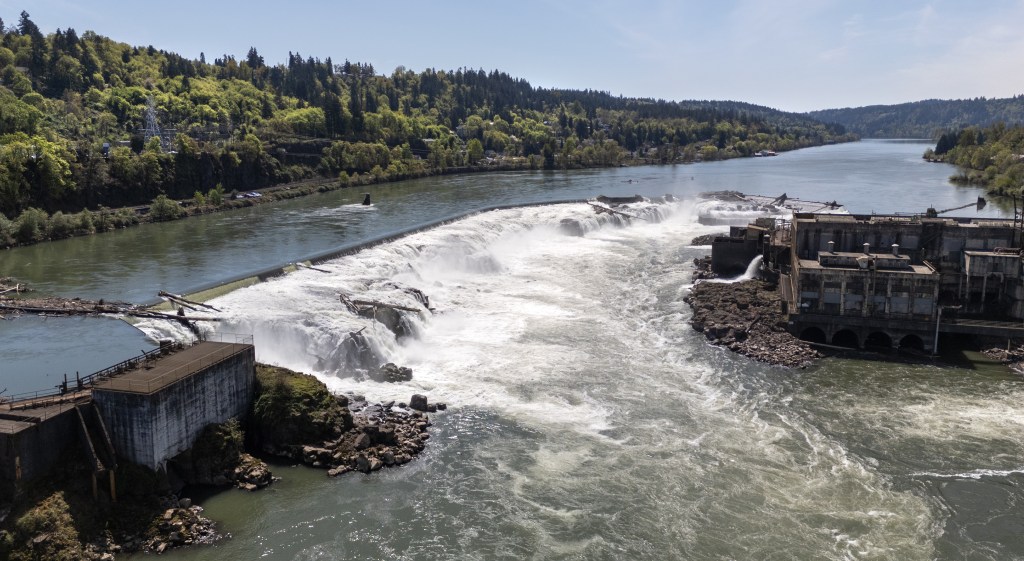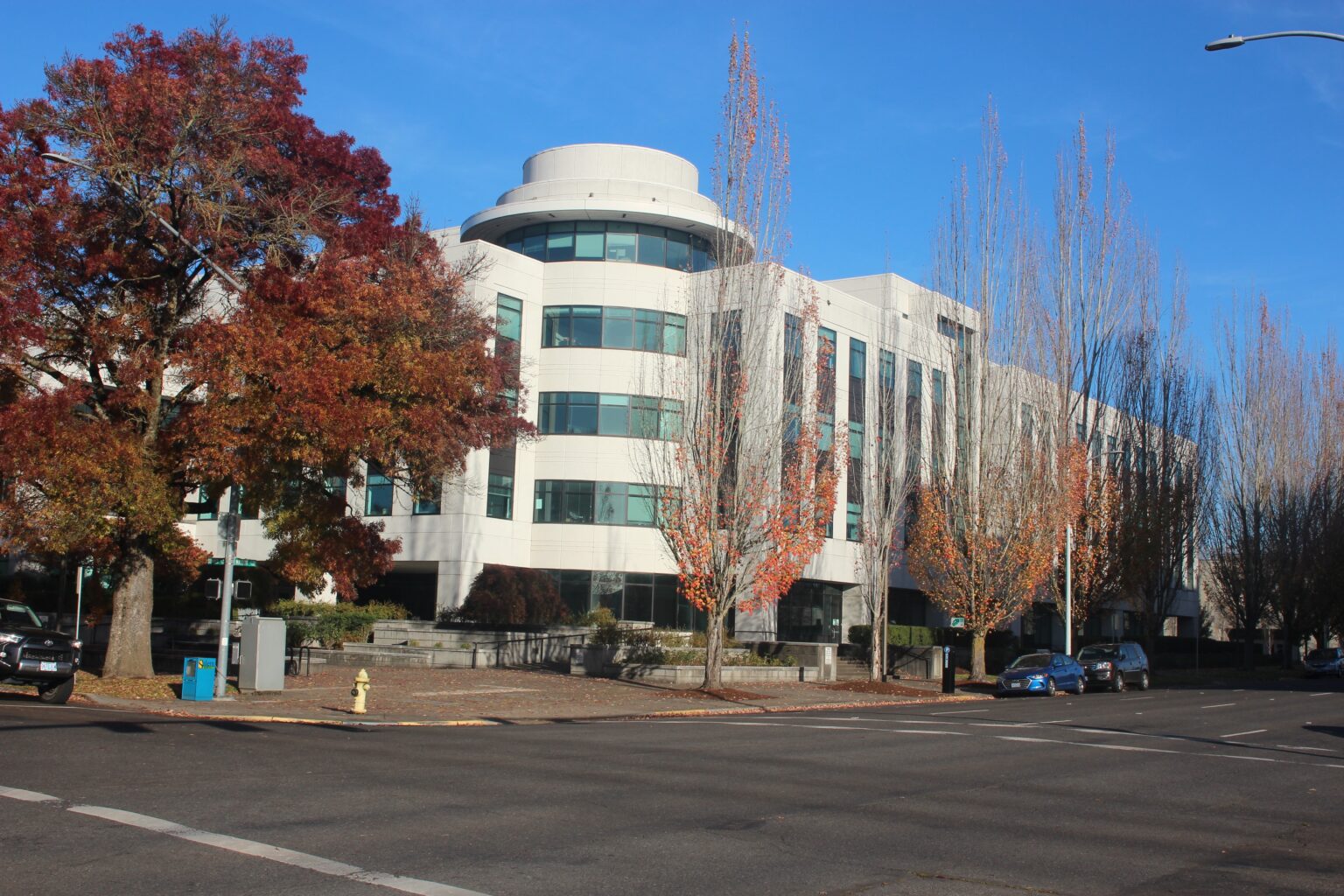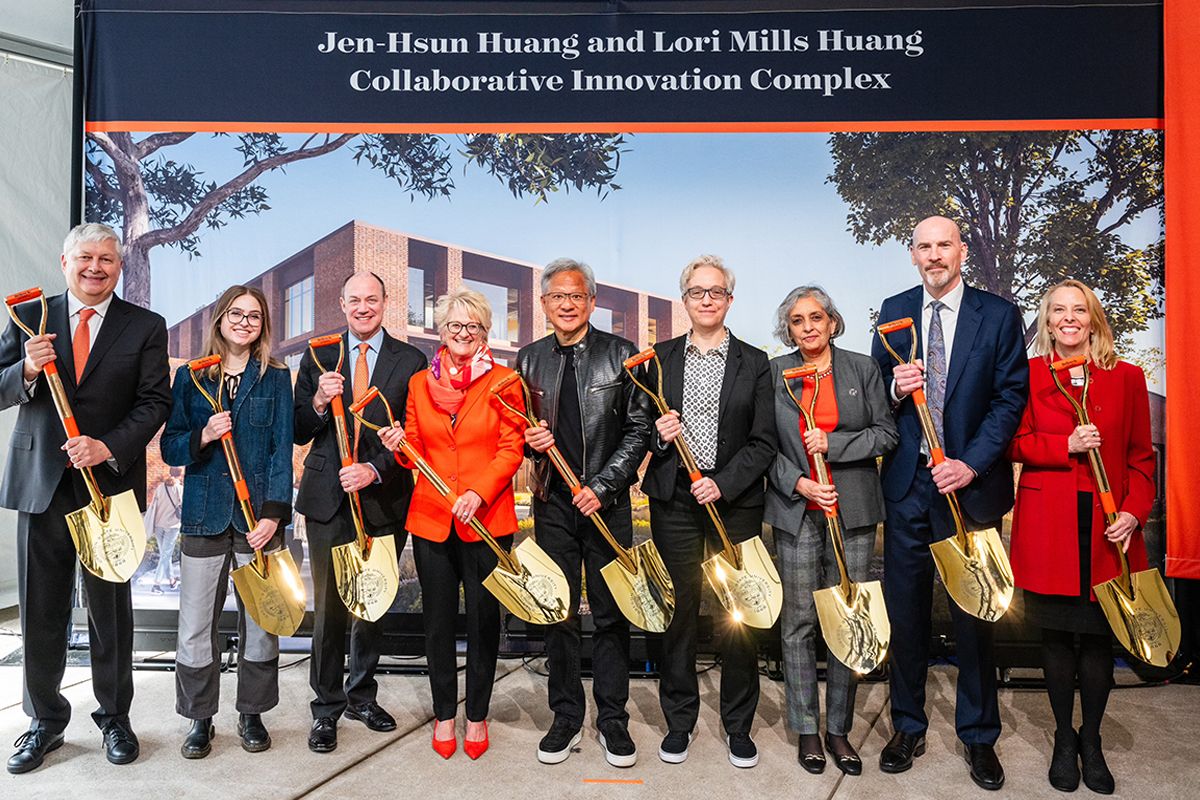Federal judge to decide PGE, Grand Ronde Willamette Falls access case in coming months
Published 10:41 am Thursday, May 8, 2025

- Willamette Falls is the second largest waterfall in North America, second only to Niagara Falls. (Jonathan House/West Linn Tidings)
Sometime in the next few months a federal judge will decide whether Portland General Electric, Oregon’s largest utility provider, is allowed to condemn 5 acres of land surrounding Willamette Falls that Indigenous people have treasured for centuries.
The decision will come as relationships between those tribes seem to be fracturing thanks to disagreements regarding access to the falls — including the dispute at issue in the land condemnation case.
When the trial between PGE, the Confederated Tribes of the Grand Ronde and the Oregon Department of State Lands concluded Tuesday, May 6, U.S. District Court Judge Michael A. Simon told the parties he would likely have a decision on the case in the next two months. He added that it could be as soon as one month or as long as three months.
Trending
Willamette Falls, a u-shaped basalt formation in the Willamette River between West Linn and Oregon City, about 26 miles upriver from the confluence with the Columbia, has been a sacred spot for peoples native to the region since time immemorial.
When pioneers moved west and settled in the area in the 19th century, the area around Willamette Falls became a major hub for industrialization, with the Willamette Falls Electric Company (a precursor to PGE) building a hydroelectric facility at the falls in 1888. A few decades prior to that, in 1855, the United States government removed the Native Americans who lived at and around the falls from their homes to reservations under the Willamette Valley Treaty. Today, regional tribes gather salmon and lamprey at the falls during annual ceremonial harvests.
PGE, which operates its hydroelectric dam on the West Linn side of the falls, first moved to condemn the 5 acres around the falls in 2022. The power company said it needed full ownership or control of the land to safely operate the dam in compliance with its license from the Federal Energy Regulatory Commission under the Federal Power Act. The Grand Ronde argues those 5 acres are property of the state.
The motion for condemnation came after PGE and four other regional tribes attempted to fight the state’s granting permission for the Grand Ronde to build a fishing platform at the base of the falls.
Those four tribes — the Confederated Tribes and Bands of the Yakama Nation, the Confederated Tribes of Umatilla Indian Reservation, the Confederated Tribes of Warm Springs and the Confederated Tribes of Siletz Indians — have all supported PGE throughout the case, with the Siletz joining the case as an amicus party in December 2022.
The Grand Ronde filed a motion to intervene in the case shortly after it was filed. The tribal group was allowed to enter the case as an intervenor-defendent, and has taken up the mantle of defending the state’s ownership of the contested property as the state took a back seat, citing a 2021 Supreme Court case which ruled that private companies could condemn land.
Trending
On Tuesday, as attorneys for the parties presented their final arguments for why or why not PGE should be allowed to condemn the land, it became clear that while in simplest terms the case is about land ownership, broader issues about safety, control over access to the falls and tribal fishing and hunting rights all come into play.
Safety
PGE argued that it’s dangerous to have multiple tribes attempting to fish at the falls while PGE conducts its own work there, especially as the state provides no oversight for these activities. There should be some type of coordination in place as a safety measure, PGE’s attorney Erick Haynie argued.
In turn the Grand Ronde contended that throughout decades of tribal fishing at the falls, PGE never raised any concerns about safety until learning that other regional tribes objected to Grand Ronde’s platform. PGE didn’t even object to the idea of the fishing platform at first, according to Grand Ronde attorney Kimberly D’Aquila.
“In 2016, PGE did not identify any project-based objections to the Grand Ronde’s proposed fishing platform; that is, until its tribal business partners objected,” D’Aquila said during Tuesday’s closing arguments.
D’Aquila pointed to testimony which suggested that PGE leaders did not want to jeopardize relationships with the Warm Springs Tribes, with whom PGE co-owns the Pelton Round Butte Dam on the Deschutes River.
D’Aquila also said the state could provide coordination between tribes to allow safe fishing, but other tribes did not want to work with the state. The other tribes have stated they should not have to go through the state to fish at lands they already have the right to use under their federal treaties.
“The simple fact that some of the tribal business partners don’t want to go to the state doesn’t give PGE the right to step in and say, ‘well we’re going to control access,’” D’Aquila said.
PGE states that with control of the property, it could provide safe fishing access for all tribes through its issuance of a Perpetual Cultural Practices Easement.
In a public letter shared before the trial, leaders from Siletz, Yakima, Umatilla and Warm Springs tribes stated that by working with the tribes to create the easement, PGE demonstrated the a commitment to “collaboration and respect to the rights of all tribes to continue their traditional uses of the Falls.”
Control
PGE argues that federal law requires the company to own or control the land within the boundary of its hydroelectric project based on its license with FERC.
The Grand Ronde argue this is not actually the case, and PGE is therefore acting in bad faith by attempting to condemn the land based on a false justification.
“For generations, PGE has operated its hydropower project safely and effectively using the property rights it already holds — rights that remain fully sufficient to meet its license obligations today,” D’Aquila argued.
Lee Ann Easton, the attorney for the Siletz Indians, argued that PGE’s control of the land and its Perpetual Cultural Practices Easement would require all tribes to coordinate with PGE in order to fish, putting them all on an even footing in terms of access.
“Grand Ronde would be subject to the perpetual cultural use easements from PGE, which requires them to coordinate both with PGE and, potentially, the other tribes on how they’re exercising their permits. That’s the only difference and I think that’s what Grand Ronde’s objecting to is partially having the need for coordinated management of this area,” Easton said.
Believing that the land around Willamette Falls is and forever should be public property, the Grand Ronde say they should not have to go through PGE in order to fish at the falls.
Tribal fishing rights
Beyond the dispute in property ownership, the case also revolves around who has the right to fish at the falls and where those rights came from.
According to Easton, the attorney for the Siletz Indians, the Grand Ronde do not have the same federal fishing rights as the other tribes.
The other tribes, Easton argued, have their rights to fish at the falls guaranteed by their treaties with the United States government. The Grand Ronde does not have those same rights because it agreed to a consent decree with certain limitations when its federal recognition as a tribe was restored in 1983.
The Siletz also had their fishing and hunting rights limited by a consent decree, but the decree was later vacated through court action. The Grand Ronde has attempted to go through the same process but has not been successful.
Yakima, Umatilla and Warm Springs never had to go through the process of having their fishing and hunting rights restored through vacation of a consent decree because they never lost their statuses as federally recognized tribes to begin with.
Because the Siletz, Yakima, Umatilla and Warm Springs all have federal rights to fish at the falls, they argued they should not have to go through the state to obtain permits for fishing, as the Grand Ronde have done.
“We’re not going to go ask the state for permission to gather and Grand Ronde right now is not in a position to do that,” Easton said. “They’re subject to a consent decree in which they agreed to limitations to their treaty rights in order to get recognition, just as Siletz have done, but we’ve gone through the process of getting our consent decree vacated by order of this court. So we are now able to exercise our treaty rights in a way that hopefully some day Grande Ronde may be willing to do.”
In addition to the right to build a platform, the Grand Ronde have obtained hunting and fishing rights, including the right to fish at the falls, from the Oregon Department of Fish and Wildlife —a move that was protested by the other tribes.
‘No one tribe is the sole caretaker of the falls’
Underscoring these disputes around fishing rights simmers another rift between the tribes about broader public access to the falls. For years, the Grand Ronde, Yakima, Umatilla, Warm Springs and Siletz Tribes worked together on the Willamette Falls Legacy Project, a joint effort with Clackamas County and Oregon City to bring a public river walk to the Oregon City side of Willamette Falls. The project would provide the public its closest access to the falls from land.
But the Grand Ronde withdrew from the public partnership in 2022, citing frustration at the lack of progress on the project. This was after the Grande Ronde’s purchase of the former Blue Heron Paper Mill in Oregon City, which overlooks the falls, with the intention of reimagining the area through a project of its own to bring public access to the falls.
At the time of the Grand Ronde’s withdrawal from the collaborative Legacy Project, other tribes in the partnership expressed disappointment, with Willamette Falls Trust Board Chair and Siletz Tribal Councilman Robert Kentta saying, “No one tribe is the sole caretaker of the falls; all five tribes have historical connections to various places, including Willamette Falls — unique unto themselves —and shared histories relating to the falls. It is not the prerogative of one tribe to say that others do not belong in such a place. It is not one tribe’s prerogative to tell the stories and interpret the connections of others to that place, try as they might.”
As Simon weighs whether to allow PGE to claim the land around the falls, all tribes continue work around Willamette Falls, with the Grand Ronde working on tumwata village at the former Blue Heron site in Oregon City and the remaining members of the Willamette Falls Trust working on the Willamette Falls Inter-Tribal Public Access Project on the West Linn side of the river.







